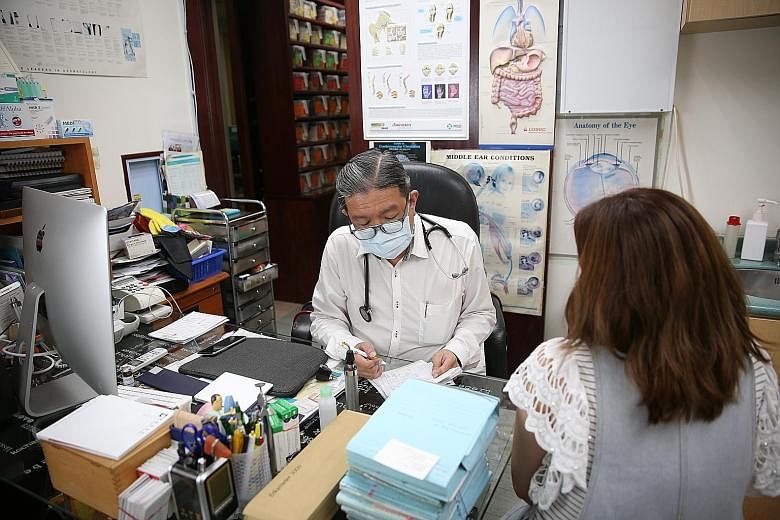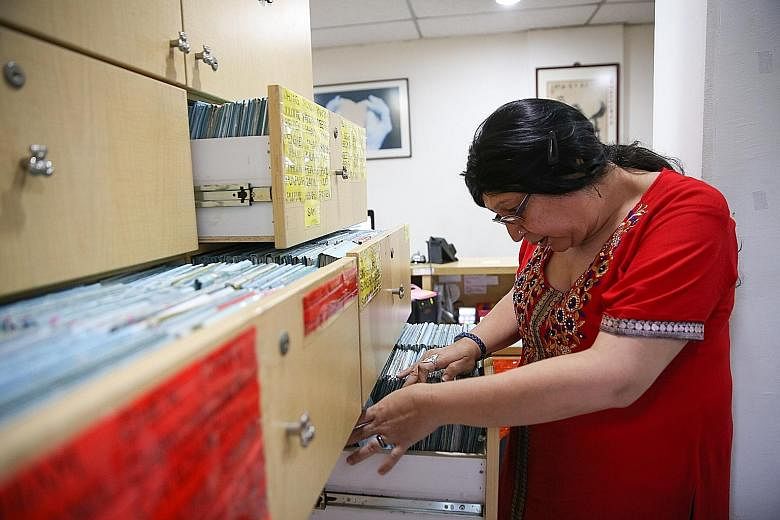At Dr Lee Yik Voon's clinic along Circuit Road, patient records are still scribbled on paper and filed away in bulky cabinets.
But at Lakeside Family Medicine Clinic, where the general practitioner (GP) also works, all this is typed into the computer and stored in a virtual cabinet.
Keeping such virtual records will become standard for healthcare professionals in Singapore, once the Ministry of Health's (MOH's) new rules to get them using the National Electronic Health Record (NEHR) system are fully implemented and become law.
GPs will be one of the largest groups affected by these plans.
Dr Lee has been running his clinic for 20 years, and more than 10 groaning drawers - each the size of a microwave oven - hold his weighty paper records.
"Every year, our drawers get heavier and every few years, we have to upgrade them because of wear and tear," he said.
He finds retrieval of records much easier with the electronic system, and does not know why he has not switched over sooner. "Maybe it's comfort, or maybe it's inertia."
But not all doctors share his positive attitude. Those in the industry said some doctors are holding back because they are not yet convinced that such electronic medical record-keeping systems will truly help.
Mr Tseng Ching-Tse, founder of medical information technology company Vault Dragon, said that if such systems make it more of a chore to input information, doctors may not see the advantages.
Some systems may also be entirely dependent on having a connection to the Internet, he added. This means that work grinds to a halt if the connection is disrupted.
Dr Siaw Tung Yeng, a practising GP who is also the founder of medical IT firm Mobile Health, said: "They see no incentive... instead of making their life more efficient, such systems make their life more miserable." His company's software tries to alleviate these problems by allowing doctors to write on tablets and ensuring that the system will still work even if the Internet is down.
Some doctors fear that such systems could mean losing the personal touch and add to waiting times at their clinics. Dr Low Kee Hwa, who runs Low Medical Clinic in Kallang Bahru and uses the NEHR, said he finds it much easier to retrieve information although he agrees that the convenience comes with a "slight loss" of personal touch.
"It is impersonal when I look only at the computer throughout the consultation. As long as we take the time to communicate with a patient before or after computer input, it helps," he said.
Others raised the issue of patient confidentiality under the NEHR, which could arise when any doctor involved in caring for a patient can access all his medical records, including visits to different doctors.
According to MOH, the idea is to give doctors a fuller picture of their patients' medical history, especially in emergency situations.
Even so, doctors said that people may prefer certain parts of their medical history to be known to one physician alone.
"For example, you might be a senior banker with thoughts of suicide and major depression, and you trust me enough to share them with me," said Dr Goh Tze Chien, who practises at a Northeast Medical Group clinic in Simei.
"I have treated you, and you are well now. Would you want all the other doctors to see these details?"
Mobile Health's Dr Siaw suggested that a "break glass" feature - where most information is disclosed only with a patient's consent but exceptions are made during emergencies - could be useful.
GPs said the NEHR system can be very useful in providing an overview of a person's health over time.
Dr Leong Choon Kit, who runs Mission Medical Clinic, said: "The majority of my patients are chronic patients, and many of them see multiple doctors."
Dr Yik Keng Yeong, who runs Tan & Yik Clinic and Surgery, said having everyone's records in one place may even help doctors sift out addicts who doctor-hop in order to get a constant supply of cough medicine or sleeping pills.
Dr Lee Yik Voon, although still using pen and paper in his own clinic, said: "Actually, I prefer electronic records because I think I can type better - my scribbling can get horrendous."



